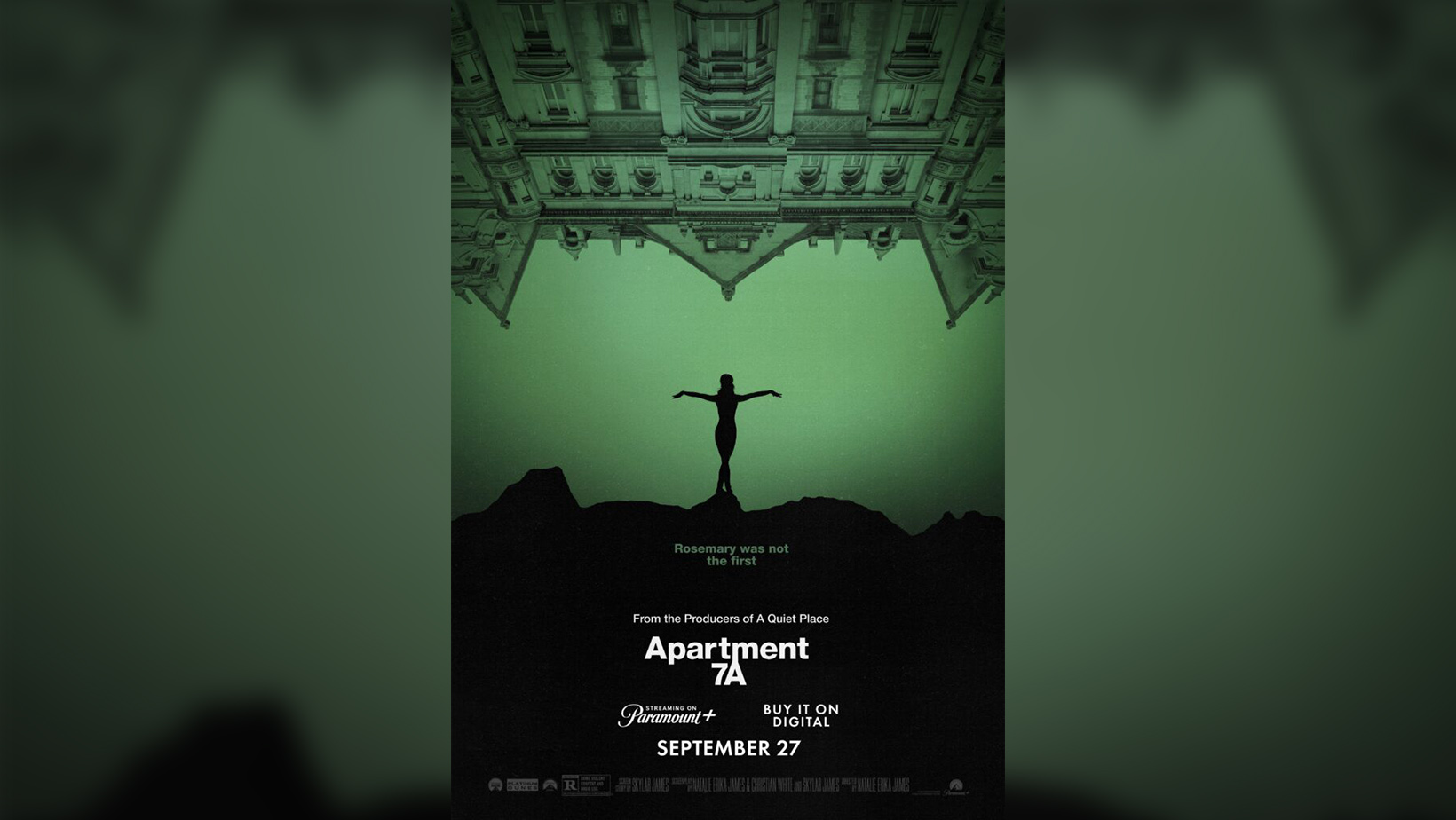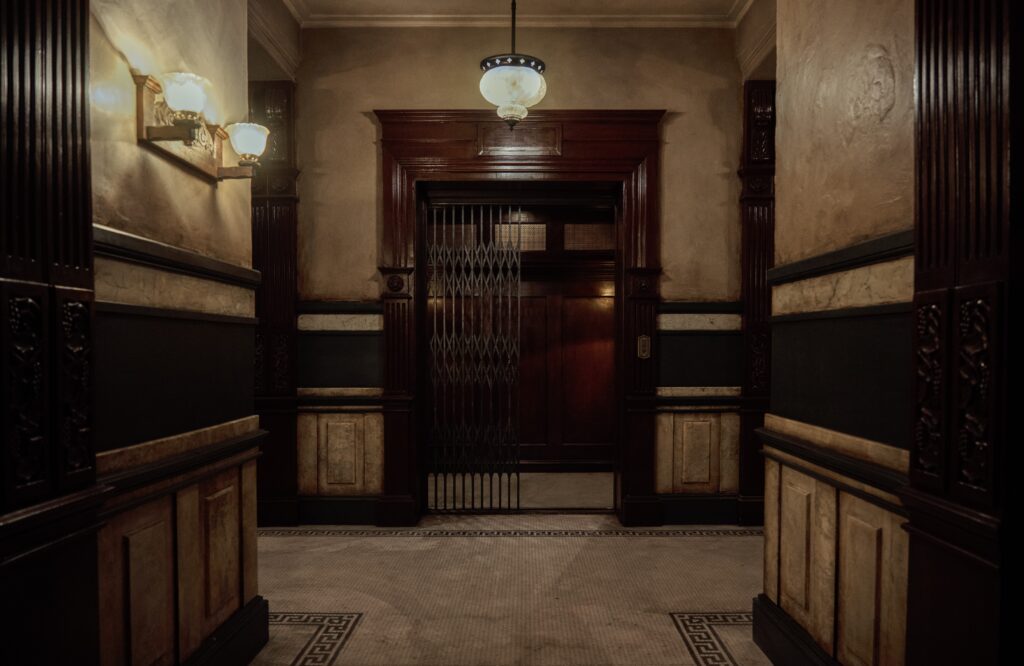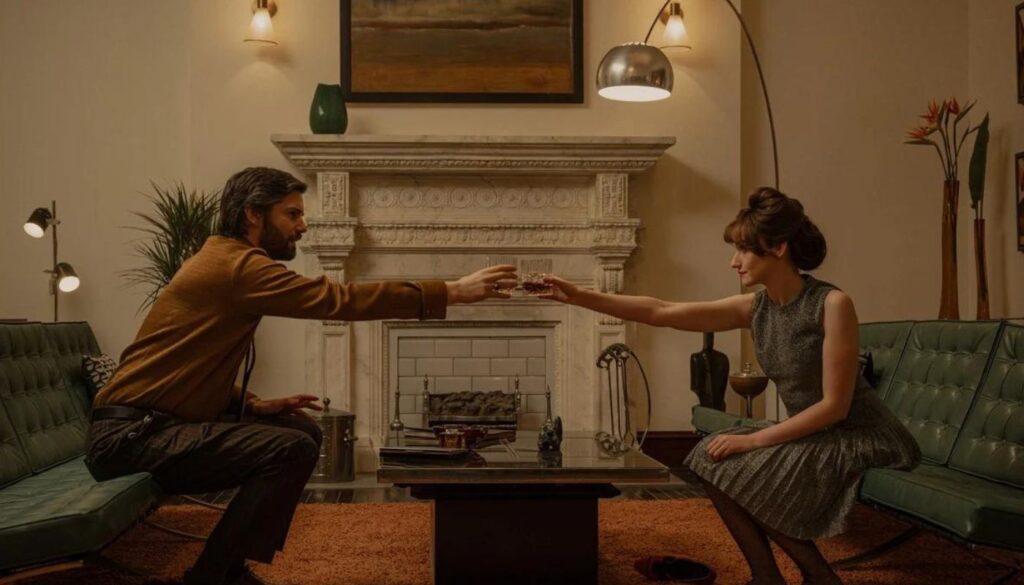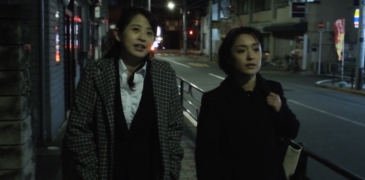
A prequel to the 1968 horror masterpiece, Roman Polanski’s Rosemary’s Baby, Natalie Erika James Apartment 7a takes place up just before Rosemary Woodhouse moves into the infamous Bramford. Apartment 7A instead follows Terry Gionoffrio (Julia Garner) an aspiring dancer/actor whose career takes a drastic turn when a nasty fall damages her ankle and turns her to persona non-grata of the New York theater scene. Running out of money, she believes to have found some luck when she is taken in by Margaux ‘Minnie’ Castevet (Dianne Wiest) and Roman Castevet (Kevin McNally) who offer her room and board to help her get back on her feet. Her new digs allow her easy access to the producer of the play, Alan Marchand (Jim Sturgess), and the chance to gain the part she desires in his recent play. After a night of drinking, a blackout, and waking up under the assumption she was taken advantage of, she gains the part, but soon learns that it came at a greater price than she could ever comprehend.

Apartment 7A Pays a Proper Homage to Its Inspirations
Natalie Erika James was one director who utterly impressed me in her feature film debut, the vastly underrated and overlooked Relic. A poignant exploration of both sisterhood and the trials that come with a loved one suffering from Alzheimer’s disease, the movie managed to have narrative depth while still bringing the horror. As such, I had high hopes going into Apartment 7a, but the actual outcome is much greater than I had originally anticipated. James has not only offered a highly polished horror movie with the same visual and narrative depth as her previous work, but she also offers a stunning period piece that pays proper homage to one of the most revered horror movies of all time. Apartment 7A touches on the same perfection of its inspiration, while perfectly tailoring it for a modern audience.
To clarify, when I say modern audience the work unto itself is not insular to modern sentiments, rather it has the flair of more familiar crawling, atmospheric horror punctuated by moments of visual chaos that will vibe with fans of A24 or Neon productions. At the same time, the movie lacks the pretentiousness that comes with some of the works from the aforementioned studios, and at its core, Apartment 7A is a simple story of a woman’s aspirations coming in conflict with the desire of some very evil people and entities. The story is simple to follow and will be somewhat predictable to the more astute moviegoer, but the journey there is so expertly crafted that one will want to see how the feature gets to the inevitable.
The use of music, particularly in the scene where Terry Gionoffrio meets with a bedazzled devil after dancing the halls of a dingy set is a wonderous mix of Hollywood euphoric polish and abstract horror. Adversely, Apartment 7A is not opposed to hitting the audience with a well-timed jump scare; always well executed, never a crutch. Outside of the horror elements, Natalie Erika James emerges the viewer in the glamor of the theater scene of New York, with impeccable beauty on stage, high fashion, and classic kitchen interiors. The movie is a visual treat and fully immersive wherever the viewer goes with Terry Gionoffrio.

They Don’t Make Satanism Like That Anymore
The other aspect that works exceptionally well in conveying the horror is the approach to Satanism and the occult that Apartment 7A takes. One gets the impression of established evil, reflected through being a means to secure favor by the elite of New York. At the same time, there is a clash of old vs. new, with Terry learning about books, charms, and even getting a salve from one of the elite that allows her to miraculously spring back from her injury.
Opposite the more subtle touch on ancient occult religions, Terry does come close to touching real darkness on various occasions in the form of quick visions of a few different entities. These imposing figures are used in reserve so that when they do appear they make quite the visual statement. The ‘bedazzled demon,’ for myself has to be one of the cooler interpretations of the ‘devil,’ to grace the scene, perfectly embodying the desires of Terry for fame and reflecting it to her in a nightmarish vision.
The different ways in which Satan and his followers are approached in the movie give the pervasive sense that the devil is always lingering over Terry. Whether it is through his followers or his actual visage, Terry never feels truly safe throughout the entire runtime of the movie. This makes for a gripping experience, that works in the face of the actual moments of horror being separated through longer periods of drama as the audience gets to understand Terry Gionoffrio’s character better. In this approach, Apartment 7A gives frightening visions of occult evils by focusing on Terry first and building the sense of unending dread around her.

Julia Garner Gives a Stunning Performance
As much as Natalie Erika James’ skill behind the camera is at guiding the success of Apartment 7A, one can’t overlook the performance from Julia Garner as Terry Gionoffrio to bring all the elements together. Garner embodies an ‘every woman’ type character, one whose desires of fame and feminity act as highlights of her character as opposed to her definitive elements. Julia Garner brings a certain vulnerability to her performance that makes Terry’s ordeal oddly sympathetic despite the potential disconnect of New York socialite/theater culture, and a bygone timeframe.
While one can insinuate certain elements of her fighting against a ‘patriarchy,’ and fears attached to motherhood will resonate greater with certain audiences, at no point does Terry Gionoffrio come across as self-righteous, rather a sincere human struggling against profound circumstances and evils; the perfect protagonist to catch a wide swathe of viewers.
The rest of the performances need to be taken with a grain of salt considering the source material. Dianne Wiest and Kevin McNally feel almost slightly cartoonish as Minnie and Roman Castevet, and without prior knowledge of Rosemary’s Baby, it may be too exaggerated for those unaware. Jim Sturgess as Alan Marchand does an adequate job, but his character is cold and calculated in a way that it is hard to feel much of a connection. Marli Siu, who plays Terry’s friend Annie, is one stand-out, with an outgoing and exuberant personality that captures the excitement and drive of the theater.

A Few Hiccups Keep Apartment 7A Short of Perfection
While Apartment 7A is a welcome prequel to Rosemary’s Baby, I fully believe it would have worked better having no connection to the 60s classic. This connection does make certain elements of the movie predictable, and the twist at the ending is slightly off-putting. The ending acts as a way to tie the films together as opposed to ending on the more profound triumph/tragedy of Terry Gionoffrio’s battle with evil.
The other minor hiccup is that there is one sequence in particular that looks rather amateurish in comparison to the rest of the feature in the form of a CGI Satan. This is very brief, but compared to the rest of the movie which is stunning, polished, and beautifully shot it is a quick dip in quality that is hard not to notice. A more subjective aspect is the potential to see over-acting on the part of the numerous Satanists. With knowledge of the prior film, it is hard to call this a misstep, but it does resonate a vibe that may not appeal to all. Myself, I found it a bit to overblown, especially nearing the final moments.
All things considered, Apartment 7A is so stunningly well constructed and executed that these few complaints only keep it falling short of perfection. It is a must-watch movie, one of the best horror films of 2024, and a testament to the skill of Natalie Erika James; horror fans need to keep an eye on anything she attaches her name to.

Apartment 7A is Screening as Part of Fantastic Fest 2024

More Film Festival Coverage
Laguna Ave (2021) Film Review – Cyber Punk From The Trash
Making its world debut at Fright Fest, David Buchanan’s Laguna Ave is being billed as “Shinya Tsukamoto’s Tetsuo: The Iron Man through the lens of John Waters”. Lofty praise for a…
Homebound (2021) Film Review – Family Secrets Can be Deadly
Meeting your partner’s family for the first time can be a drag, having to find out how well you get along in the family dynamic or learn some truths you…
I’ve Died A Lot Lately (2022) Film Review – Death and Rebirth of a Slacker
Having recently lost her grandmother, Satoko Sato finds herself deeply withdrawn from the pressures of Covid landing her in the position of a NEET. However, at the age of 32,…
The Alien Report (2022) Film Review – Close Encounters Done Well
“We are the children. It’s a pleasure to receive you.” Remember how we always question why alleged alien abductees live to tell the story but don’t have the evidence to…
SHC: Freak Accident (2022) Short Film Review – I’m Burning Up!
We previously had the chance to check out Thomas Burke’s short film Camping Fun, a quick dive into a small cult that showed that Burke had the knack to channel…
One Day, A Woman (2022) Film Review – A Tragic Decline of a Young Woman
After a hard day of work, 36-year-old Yuko Sawamatsu returns to her apartment for an evening to unwind. However, her memories of a recent affair with a married man keep…






